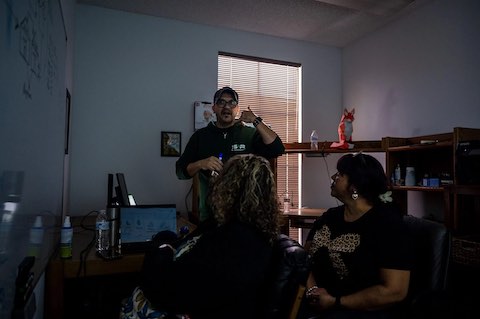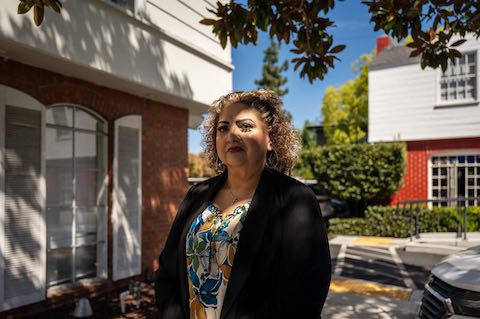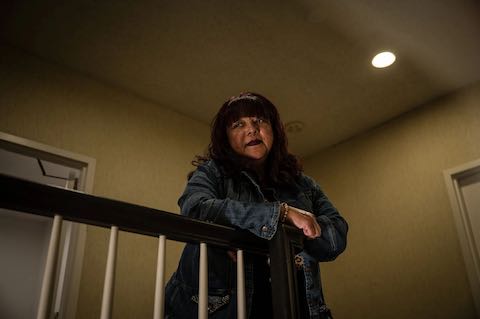
07 May A New Residential Recovery Program Will Offer Much-Needed Care for Spanish-Speaking Women in Contra Costa County

Pablo Martinez leads a policy and procedures lesson as Lissette Torres and Mercedes Pineda prepare to become certified substance abuse counselors on April 2.
Story by Jasmine Aguilera, El Tímpano | Photos by Hiram Alejandro Durán for El Tímpano/CatchLight Local/ Report for America corps member
This article was produced as a project for the USC Annenberg Center for Health Journalism’s 2025 California Health Equity Fellowship. It was originally published by El Tímpano.
Sitting in a small office in Concord in early April, long-time friends Mercedes Pineda and Lissette Torres listen closely during lesson one of their training to become certified substance abuse counselors. As bilingual Latinas, they are sorely needed in Contra Costa County, said Pablo Martinez, executive director at Support4Recovery and manager of the nonprofit’s Hispanic outreach projects. Martinez, who is delivering the day’s lesson, explains each of the documents one-by-one that future clients will need to sign, which will be provided in Spanish, he added.
Support4Recovery was awarded $400,000 in grants by the county’s Board of Supervisors in March to launch a new 12-bed residential recovery center for Spanish-speakers struggling with addiction. Half of the beds will be dedicated to Spanish-speaking women, a first in the county. While bilingual counselors do work with women clients at some recovery centers, none provide programming and treatment designed entirely for Spanish-speaking women.
The new facility will offer free six-month-long stays for women who have gone through detox, they will not be required to have insurance and all of their counseling and other programming will be in Spanish. Medication assisted treatment will be made available.
For Spanish-speaking women, accessing treatment can be an uphill battle, Martinez said. Research on Spanish-speaking women and substance abuse disorder is limited, but stigma against addiction in Latino communities is well documented. Latinas, especially first generation immigrants, are often expected to refrain entirely from alcohol, cigarettes and other drugs, be model caregivers and dedicate themselves to motherhood. There are additional cultural and systemic hurdles to accessing addiction treatment—on top of language barriers, they could fear being perceived as a bad mother, run the risk of children being removed from their custody because of their addiction or could be unable to find dedicated childcare for the duration of their treatment.
“Coming from a Hispanic family, I understand them,” Pineda said. “It could have a lot to do with being a mom and just allowing yourself to be in the turmoil of physical abuse [or] with addiction, and wanting a way out, but…you feel that you can’t.”
Support4Recovery, which is based in Concord and provides addiction treatment services for Contra Costa County residents, has been working since 2022 to launch a facility specifically for Spanish-speaking women. A residential recovery facility with 12 beds is available in the county for Spanish-speaking men, but no equivalent has existed for women.
“There’s an access line in Contra Costa county,” Martinez said. “You call the access line for substance abuse, and if you’re a woman and you don’t speak the language, they basically tell you, ‘Sorry, we can’t really do anything.’”
‘I know the need is great’
- Lisette Torres poses for a portrait outside of Support4Recovery in Concord.
It was a struggle to prove there was a need for residential treatment for Spanish-speaking women, Martinez said. While some research suggests that Latino immigrants’ consumption of drugs and alcohol increases the longer they spend in the United States, the role of gender hasn’t extensively been researched.
“In 2022, when I started doing all this research, definitely, you go online and there’s absolutely nothing,” Martinez said. “Especially when you’re talking about grants, people want to see the data.”
Much of the research that does exist relies on surveys, which could be unreliable, because taboos that run deep in many Latino communities might make it difficult for some to admit they are struggling with substance abuse.
The team at Support4Recovery, however, said they’ve witnessed the need for culturally competent Spanish-language treatment.
Torres said she struggled with drug addiction in the early 2000s. She didn’t seek help until after her children were removed from her custody. “In the American society, it’s known to have a lot of drug addiction, unfortunately,” Torres said, adding that for her, the shame of admitting to drug addiction is comparable to admitting to domestic abuse. “Being a Hispanic…It’s embarrassing to say that your husband is, you know, beating you up. But then for me, it was embarrassing to even say I was a drug addict.”
Torres, who speaks both English and Spanish fluently, has been sober now for 15 years. While in treatment she says she witnessed other women who didn’t know English struggling to finish the program or who were turned away altogether.
Pineda was one of the people to help Torres through her treatment and has worked with families struggling with substance abuse for more than 15 years. “I know the need is great,” she said. “It’s evident.”
Creating a pipeline
Contra Costa County is about 28% Hispanic, according to the U.S. Census Bureau, and nearly 38% of the population speaks a language other than English at home—mostly Spanish. But mental health and substance abuse services in Spanish can be tough to access.
The challenge for the county, according to Fatima Matal Sol, chief of the county’s Alcohol and Other Drugs Services was to learn how to better funnel Latinos into treatment. While Contra Costa runs an access line for people to call in and request help for substance abuse and mental health, Latinos hardly ever call, she said, likely because of taboos and the lack of awareness of the services that are offered by the county. In-person outreach attempts proved unsuccessful, and it was a challenge to find bilingual counselors.
One solution AODS found was to place bilingual counselors in jails to reach people who have been charged with alcohol- or drug-related offenses.
“I decided we need to create a pipeline. We need to look at where is it that Latinos are with the problem—where they cannot say, ‘I don’t have a substance use problem,’” Matal Sol said. “When the disease is already a disease out of control.”
Still, she added, Latinas are underrepresented in treatment. “In general, women enter treatment at a lower rate than men,” Matal Sol said, adding that stigma and shame adds to the challenge.
“I think we’re ashamed, we’re embarrassed,” she says. “I would be very [embarrassed] myself, and I don’t have a substance use issue. I would be very embarrassed in the same way that I would be very embarrassed of domestic violence.”
Launching a new facility
- Mercedes Pineda waits for Torres outside of Support4Recovery offices where they’re completing their substance abuse counselors training.
Pineda and Torres will continue their training sessions with Martinez for four more sessions, but becoming certified counselors is a five-year process. Meanwhile, Martinez will be taking steps to find a location for the new residential facility. The plan, he says, is for there to be two separate spaces for men and women, and for Pineda and Torres to eventually become full time employees at the women’s facility through additional fundraising. The facility, which will be called “Raices Fuertes,” or “Strong Roots,” is expected to open in July.
Torres and Pineda say they hope the new facility will inspire more openness among Latinos in Contra Costa County to discuss the ways addiction impacts women in their community.
Torres has seen plenty of women she knows the facility might be able to help, she said. A few months ago, for example, she met a woman at a Narcotics Anonymous meeting in Antioch.
“This lady comes in and she spoke only Spanish, but she was just broken, like, to the point that she’s like, no puedo decir a mi familia que yo estoy tomando y haciendo drogas,” or “I can’t tell my family that I am drinking and using drugs,” she said. “And I told her, you know, ‘Come, keep coming.’”
“For us Latinas, you know, as a mother—we are mothers—we can’t fail in our culture, because if you fail, you’re weak,” she added. “I want the woman to understand that there is hope. There is ayuda, there’s help.”
Jasmine Aguilera reported this story while participating in the USC Annenberg Center for Health Journalism’s 2025 California Health Equity Fellowship.








No Comments